#palestinian food
Explore tagged Tumblr posts
Text

#yemen#jerusalem#tel aviv#current events#palestine#free palestine#gaza#free gaza#news on gaza#palestine news#news update#war news#war on gaza#palestinian resilience#palestinian food#food#food videos#hopecore
50K notes
·
View notes
Text
Source
44K notes
·
View notes
Text
Ka’ak Al-Quds Bread (click link for recipe)
INGREDIENTS
Yeast mixture:
2 cups Warm water
1 tbsp Active dry yeast
1 tbsp Sugar
Rest of dough ingredients:
5 1/2 cups All-purpose flour
1 tbsp Salt
1 tsp Baking powder
1/4 cup Olive oil
3 tbsp Powdered milk
1/4 – 1/2 cup Water if you feel like your dough is a bit dry, start with adding an extra 1/4 cup of water and go from there. The factors of where you live (the climate/altitude plays a big part in most bread recipes)
Topping:
1 cup Water
1 tbsp Pomegranate molasses
1 tbsp Honey
8 oz Sesame seeds
5K notes
·
View notes
Text
Support Local Palestinian Businesses!!!
This is Freddy Zebara, the owner of King of Falafel and Shawarma. He is Palestinian. As many of you know, Palestinians outside of Palestine are facing many challenges regarding discrimination and hate crimes.
We must be there for our Palestinian sisters and brothers no matter where they are.
If you live in New York, heck if you like to try good food, please support Freddy at his shop.
The location is 3015 Broadway, Astoria, NY 11106.
#free palestine#palestine#gaza#from the river to the sea palestine will be free#pray for palestine#free gaza#support palestinian business#Freddy Zebara#new york#queens nyc#nyc#falafel#food#cultural food#ceasefire#permanent ceasefire#foodie#palestinian food#usa#america
2K notes
·
View notes
Text
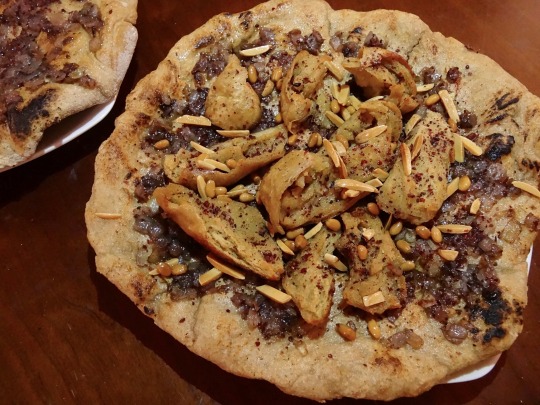

[ID: Two large flatbreads. The one in the center is topped with bright purple onions, faux chicken, fried nuts, and coarse red sumac; the one at the side is topped with onions and sumac. Second image is a close-up. End ID]
مسخن / Musakhkhan (Palestinian flatbread with onions and sumac)
Musakhkhan (مُسَخَّن; also "musakhan" or "moussakhan") is a dish historically made by Palestinian farmers during the olive harvest season of October and November: naturally leavened flatbread is cooked in clay ovens, dipped in plenty of freshly pressed olive oil, and then covered with oily, richly caramelized onions fragrant with sumac. Modern versions of the dish add spiced, boiled and baked chicken along with toasted or fried pine nuts and almonds. It is eaten with the hands, and sometimes served alongside a soup made from the stock produced by boiling the chicken. The name of the dish literally means "heated," from سَخَّنَ "sakhkhana" "to heat" + the participle prefix مُـ "mu".
I have provided instructions for including 'chicken,' but I don't think the dish suffers from its lack: the rich, slightly sour fermented wheat bread, the deep sweetness of the caramelised onions, and the true, clean, bright expressions of olive oil and sumac make this dish a must-try even in its original, plainer form.
Musakhkhan is often considered to be the national dish of Palestine. Like foods such as za'tar, hummus, tahina, and frika, it is significant for its historical and emotional associations, and for the way it links people, place, identity, and memory; it is also understood to be symbolic of a deeply rooted connection to the land, and thus of liberation struggle. The dish is liberally covered with the fruit of Palestinian lands in the form of onions, olive oil, and sumac (the dried and ground berries of a wild-growing bush).
The symbolic resonance of olive oil may be imputed to its history in the area. In historical Palestine (before the British Mandate period), agriculture and income from agricultural exports made up the bulk of the economy. Under مُشَاعْ (mushā', "common"; also transliterated "musha'a") systems of land tenure, communally owned plots of land were divided into parcels which were rotated between members of large kinship groups (rather than one parcel belonging to a private owner and their descendants into perpetuity). Olive trees were grown over much of the land, including on terraced hills, and their oil was used for culinary purposes and to make soap; excess was exported. In the early 1920s, Palestinian farmers produced 5,000 tons of olive oil a year, making an average of 342,000 PL (Palestinian pounds, equivalent to pounds sterling) from exports to Egypt alone.
During the British Mandate period (from 1917 to 1948, when Britain was given the administration of Palestine by the League of Nations after World War 1), acres of densely populated and cultivated land were expropriated from Palestinians through legal strongarming of and direct violence against, including killing of, فَلّاَحين (fallahin, peasants; singular "فَلَّاح" "fallah") by British troops. This continued a campaign of dispossession that had begun in the late 19th century.
By 1941, an estimated 119,000 peasants had been dispossessed of land (30% of all Palestinian families involved in agriculture); many of them had moved to other areas, while those who stayed were largely destitute. The agriculturally rich Nablus area (north of Jerusalem), for example, was largely empty by 1934: Haaretz reported that it was "no longer the town of gold [i.e., oranges], neither is it the town of trade [i.e., olive oil]. Nablus rather has become the town of empty houses, of darkness and of misery". Farmers led rebellions against this expropriation in 1929, 1933, and 1936-9, which were brutually repressed by the British military.
Despite the number of farmers who had been displaced from their land by European Jewish private owners and cooperatives (which owned 24.5% of all cultivated land in Palestine by 1941), the amount of olives produced by Palestinians increased from 34,000 tons in 1931 to 78,300 in 1945, evidencing an investment in and expansion of agriculture by indigenous inhabitants. Thus it does not seem likely that vast swathes of land were "waste land," or that the musha' system did not allow for "development"!
Imprecations against the musha' system were nevertheless used as justification to force Palestinians from their land. After various Zionist organizations and militant groups succeeded in pushing Britain out of Palestine in 1948—clearing the way for hundreds of thousands of Palestinians to be dispossessed or killed during the Nakba—the Israeli parliament began constructing a framework to render their expropriation of land legal; the Cultivation of Waste Lands Law of 1949, for example, allowed the requisition of uncultivated land, while the Absentees’ Property Law of 1950 allowed the state to requisition the land of people it had forced from their homes.
Israel profited from its dispossession of millions of dunums of land; 40,000 dunums of vineyards, 100,000 dunums of citrus groves, and 95% of the olive groves in the new state were stolen from Palestinians during this period, and the agricultural subsidies bolstered by these properties were used to lure new settlers in with promises of large incomes.
It also profited from the resulting "de-development" of the Palestinian economy, of which the decline in trade of olive oil furnishes a striking example. Palestinian olive farmers were unable to compete with the cheaper oils (olive and other types) with which Zionist, capital-driven industry flooded the market; by 1936, the 342,000 PL in olive oil exports of the early 1920s had fallen to 52,091 PL, and thereafter to nothing. While selling to a Palestinian captive market, Israel was also exporting the fruits of confiscated Palestinian land to Europe and elsewhere; in 1949, olives produced on stolen land were Israel's third-largest export. As of 2014, 12.9% of the olives exported to Europe were grown in the occupied West Bank alone.
This process of de-development and profiteering accelerated after Israel's military seizure of the West Bank and Gaza in 1967. In 1970, agriculture made up 34% of the GDP of the West Bank, and 31% of that of Gaza; in 2000, it was 16% and 18%, respectively. Many of those out of work due to expropriated or newly unworkable land were hired as day laborers on Israeli farms.
Meanwhile, Palestinians (and Israeli Palestinians) continued to plant and cultivate olives. The fact that Palestinians do not control their own water supplies or borders and may expect at any time to be barred by the military from harvesting their fields has discouraged investment and led to risk aversion (especially since the outmoding of the musha' system, which had minimized individual risk). In this environment, olive trees are attractive because they are low-input. They can subsist on rainwater (Israel monopolizes and poisons much of the region's water, and heavily taxes imports of materials that could be used to build irrigation systems), and don't require high-quality soil or daily weeding. Olive trees, unlike factories and agricultural technology, don't need large inputs of capital that stand to be wasted if the Israeli military destroys them.
Olive trees are therefore the chosen crop when proving a continued use of land in order to prevent the Israeli military from expropriating it under various "waste" or "absentee" land laws. Palestinians immediately plant olive seedlings on land they have been temporarily forced from, since even land that has lain fallow due to status as a military closed zone can be appropriated with this justification. The danger is so pressing that Palestinian agronomists encouraged this habit (as of 1993), despite the fact that Israeli competition and continual planting had lowered olive crop prices, and despite the decline in soil quality that results from never allowing land to lie fallow. In more recent years, olive trees have yielded primary or supplementary income for about 100,000 Palestinian families, producing up to 191 million USD in value in good years (including an average of 17,000 tons of olive oil yearly between 2001 and 2009).
Israeli soldiers and settlers have famously uprooted, vandalized, razed, and burned millions of these olive trees, as well as using military outposts to deny Palestinian farmers access to their olive crops. It prefers to restrict Palestinians to annual crops, such as vegetables and grains, and eliminate competition in permanent crops, such as fruit trees.
This targeting of olive trees increases during times of intensified conflict. During the currently ongoing olive harvest season (November 2023), Gazan olive farmers have reported being targeted by Israeli war planes; some farmers in the West Bank have given up on harvesting their trees altogether, due to threats issued by organized networks of settlers that they would kill anyone seen making the attempt.
The rootedness of olive trees in the history of Palestine gives them weight as a symbol of homeland, culture, and the fight for liberation. Palestinian olive harvest festivals, typically celebrated in October with singing, dancing, and eating, have inspired similar events elsewhere in the world, aimed at sharing Palestinian food and culture and expressing solidarity with those living under occupation.
Support Palestinian resistance by calling Elbit System’s (Israel’s primary weapons manufacturer) landlord, donating to Palestine Action’s bail fund, and donating to the Bay Area Anti-Repression Committee bail fund.
Ingredients:
For the dish:
2 pieces taboon bread, preferably freshly baked
2 large or 3 medium yellow onions (480g)
1 cup first cold press extra virgin olive oil (زيت زيتون البكر الممتاز)
1 Tbsp coarsely ground Levantine sumac (سماق شامي / sumaq shami), plus more to top
Ground black pepper
For the chicken (optional):
500g chicken substitute
5 green cardamom pods, or 1/4 tsp ground cardamom
4 cloves, or pinch ground cloves
1 Mediterranean bay leaf
1 Tbsp ground sumac
For the nut topping (optional):
2 Tbsp slivered almonds
2 Tbsp pine nuts
Neutral oil, for frying
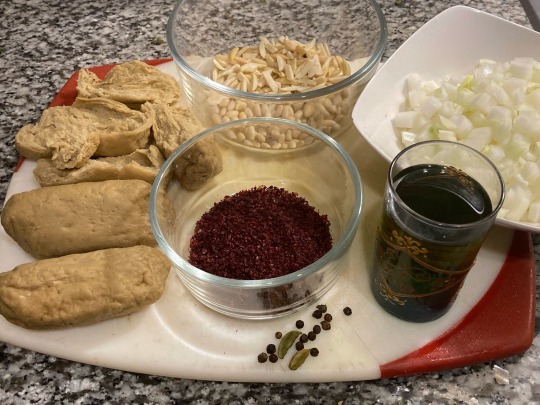
Notes on ingredients:
Use the best olive oil that you can. You will want oil that has some opacity to it or some deposits in it. I used Aleppo brand olive oil (7 USD a liter at my local halal grocery).
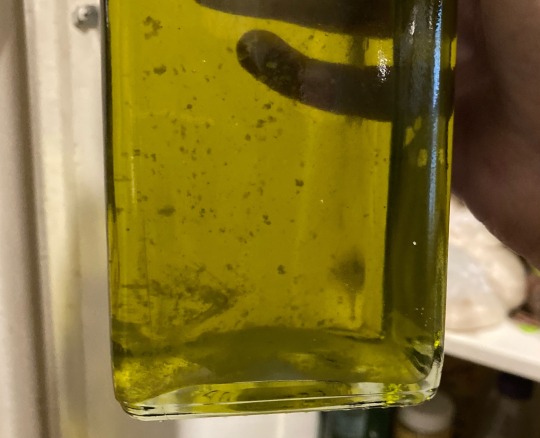
If you want to replace the taboon bread with something less laborious, I would recommend something that mimics the rich, fermented flavor of the traditional, whole-wheat, naturally leavened bread. Many people today make taboon bread with white flour and commercial yeast—which you might mimic by using storebought naan or lavash, for example—but I think the slight sourness of the flatbread is a beautiful counterpoint to the brightness of the sumac and the sweetness of the caramelized onions. I would go with a sourdough pizza crust or something similar.
Your sumac should be coarsely ground, not finely powdered; and a deep, rich red, not pinkish in color (like the pile on the right, not the one on the left).

For this dish, a whole chicken is usually first boiled (perhaps with spices including bay leaves, cardamom, and cloves) and then baked, sometimes along with some of the oil from frying the onions. I call for just frying or baking instead; in my opinion, boiling often has a negative effect on the texture of meat substitutes.
Instructions:
For the onions:
1. Heat a cup of olive oil in a large skillet or pot. Fry onions on medium-low, stirring often, for 10 minutes or until translucent.

2. Add 1 Tbsp sumac and a few cracks of black pepper and reduce to low. Cook for another 30 minutes, stirring occasionally, until onions are sweet, reduced in volume, and pinkish in color.
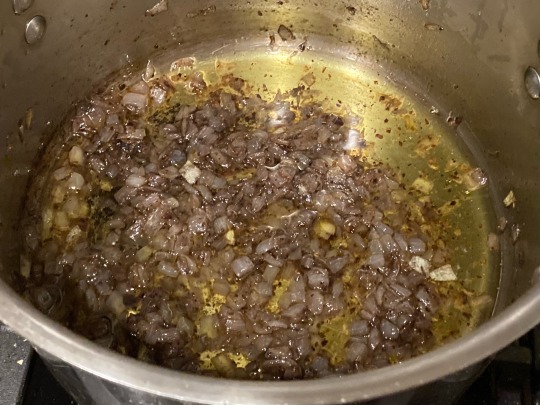
For the chicken:
1. Briefly toast and finely grind spices except for sumac (cardamom, cloves, and bay leaf). Filter with a fine mesh sieve. Dip 'chicken' into the pot in which you fried the onions to coat it with olive oil, then rub spices (including sumac) onto the surface.
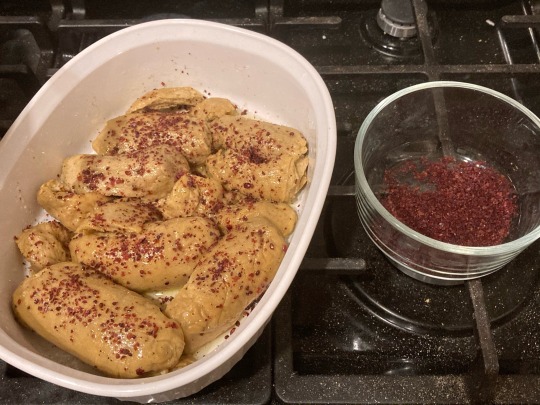
2. Sear chicken in a dry skillet until browned on all sides; or bake, uncovered, in the top third of an oven heated to 400 °F (200 °C) until browned.
For the nut topping:
1. Heat a neutral oil on medium in a small pot or skillet. Add almonds and fry for 2 minutes, until just starting to take on color. Add pine nuts and fry until both almonds and pine nuts are golden brown. Remove with a slotted spoon.
To assemble:
1. Dip each flatbread in the olive oil used to fry the onions, then spread onions over the surface.
Some cooks dip the bread entirely into oil; others press it lightly into the surface of the oil in the pot on both sides, or one side; a more modern method calls for mixing the olive oil with chicken broth to lighten it. Consult your taste. I think the bread from my taboon recipe stands up well to being pressed into the oil on both sides without tearing or becoming soggy.
2. Top flatbread with chicken and several large pinches more sumac. Bake briefly in the oven (still heated to 400 °F / 200 °C), or broil on low, for 3-5 minutes, until the sumac and the surface of the bread have darkened a shade.
3. Top with fried nuts.
Musakhkhan is usually eaten by ripping the chicken into bite-sized pieces, tearing off a bit of bread, and eating the chicken using the bread.
Some cooks make a layered musakhkhan, adding two to three pieces of bread covered with onions on top of each other before topping the entire construction with chicken and pine nuts.
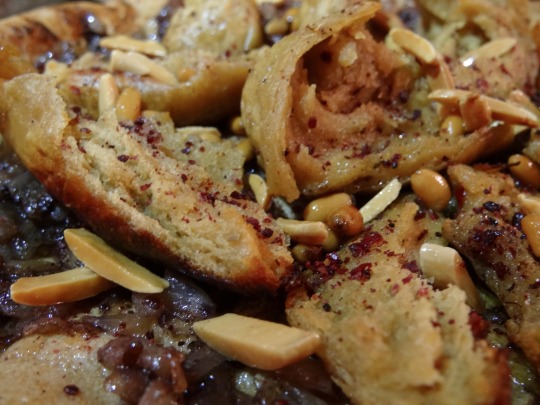
817 notes
·
View notes
Text


Found in an Irish group on Facebook.
Reminder for vegans: oat milk and cashew milk with a bit of vinegar or lemon juice (tablespoon per cup of milk) is a good substitute for buttermilk.
30 notes
·
View notes
Text



jaffa oranges were bred by palestinian citrus grower anton ayub in the mid-1800s, and were called shamouti oranges. they are exceptionally sweet and have fewer seeds than most oranges, as well as thicker skins, making export monumentally easier. all other orange varieties historically have been judged by their standard. they've been enjoyed from palestine to england to the states. they were the largest export from palestine from the early 20th century to 1939. with the colonisation of palestine, nearly all of the orchards were taken out of palestinian hands in the nakba. to today, they symbolise the original and ongoing nakba of palestine.
palestian-inspired jaffa cakes
orange & olive oil brownies
orange chiffon cake
orange jam
orange, feta, & almond filo pie, with oregano
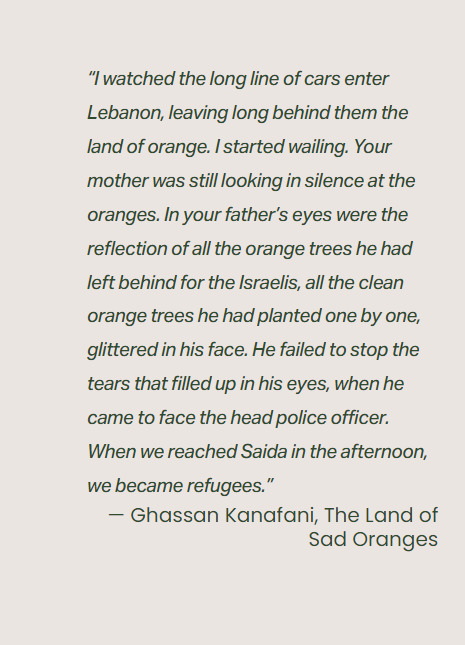
#palestine#free palestine#palestinian food#desserts#baking#summer aesthetic#recipes#historical#dips and spreads#fruit
68 notes
·
View notes
Text
Cultural Appropriation in Settler colonialism is nothing new, reaching into every facet of a country's identity and globally rebranding it as their own, to steal a history and an identity in an attempt to delegitamise native peoples, culture, history and community, erase their connection to their own land and violently assert the coloniser as 'authentic'.
Even in crops, produce and food, ingredients and recipes are stolen from Palestine and rebranded as 'Israeli' , in yet another blatant attempt to erase Palestinian culture, history and people and their true historical connection to their own land.
A country's food is its identity. Its history. Its connnection to land. All the things violent settler colonies like Israel wish to erase by ursurping. But it is not their history. It is not their identity. It is not their land. Zionists are historically European.
Do not let Israel erase Palestinian identity by staying silent about their cultural identity theft. Google Palestinan cuisine specifically, correct anyone anywhere and everywhere calling it Israeli. That is not their food. That is not their culture. That is not their History. That is Not their Land.
Israel has never been and is still not a peaceful immigrant population. They are genocidal thieves who wish to legitimise themselves and claim stolen land that has always belonged to other people by erasing the original native population, their culture, history and identity.
youtube
#decolonise Palestine#Palestine#Free Palestine#israel is a terrorist state#important#gaza#Free Gaza#Free the West Bank#save Palestine#Watermelon#human rights#truth#food#recipes#cultural identity#settler colonialism#psa#cuisine#palestinian cuisine#palestinian food#palestinian recipes#ingredients#palestinian ingredients#olive oil#palestinian olive oil#falafel#zaatar#Youtube
20 notes
·
View notes
Text
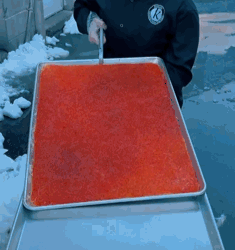
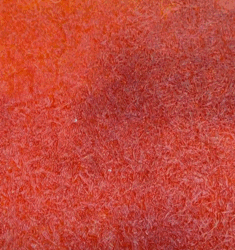
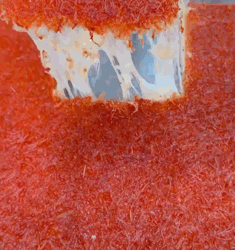
.🍁 TRUSTED ORGANISATIONS TO DONATE TO
"Kanafeh Nabulsieh originated in the Palestinian city of Nablus, hence the name Nabulsieh. Nablus is still renowned for its kanafeh, which consists of mild white cheese and shredded wheat surface, which is covered by sugar syrup." - source
#كنافة#knafeh#kanafeh#palestine#palestinian food#free palestine#🍉#stim#gifset#*mine#red#food#hands#sensory#cheese
43 notes
·
View notes
Text


last night, my pro-palestine student group organized a palestinian cuisine event along with the local palestinian diaspora. we were also helped by friends from syria, iraq, lebanon, and egypt. it was absolutely amazing. and the food—oh my god, the best thing i’ve ever had in my life, no joke!!!!
#the hand on the first pic is mine btw :3#i have a palestinian flag colors bracelet that i wear everyday#it was so good#and so nice#i’m so glad we could pull this off because i was so stressed out about finding a big enough place and everything#tbh i’ve been rotting in bed for the whole day bc yesterday’s was so crazy and just a lot#but i am so happy we could organize this and bring everyone together#maqluba#qatayef#baklava#malfouf#activism#palestine#free palestine#students for justice in palestine#free gaza#from the river to the sea palestine will be free#free lebanon#palestinian food#palestinian culture#arabic food#moira speaks#personal
23 notes
·
View notes
Text
Palestinian Arayes - May 7th 2024
30 notes
·
View notes
Text
Zataar Manakeesh
#Palestine#palestinians#Palestinian recipe#recipe#recipes#food#mxriyum#bread#foodblr#palestinian food#mine
1K notes
·
View notes
Text








Had the best shawarma & falafel of my life in Astoria for my bday <3
#astoria#palestinian food#free palestine#fuck israel#fujifilm finepix z30#digital camera#falafel#shwarma
18 notes
·
View notes
Text
This is Palestinian Food
youtube
Shout out to this foodie youtuber for making a video on Palestinian cuisine!!! 🇪🇭🍉🫂
#free palestine#palestine#gaza#free gaza#palestine news#palestinian children#palestinian families#news on gaza#rafah#palestinian news#youtube#video#palestinian culture#palestinian cuisine#palestinian food#Palestinian#palestina#food#foodie
10 notes
·
View notes
Text








#genocide of indigenous people never ended#real story of thanksgiving#fuck thanksgiving#thanksgiving#indigenous#whitewashing of genocide#genocide#indigenous rights#indigenous food#wojapi#bison ribs#European settlers#settler colonialism#settler colonialism has stolen the lives and lands of millions around the globe and across millenia#rummaniyeh#palestine#palestinian food#pomegranate#jaffa#nakba 1948#sopa de mani#bolivia#indigenous andeans#afang soup#efik#nigeria#ibibio#indigenous roots#indigenous of the americas#know your history
8 notes
·
View notes
Text
some food studies i never posted

#ryeart#art#art study#food#food art#food illustration#palestinian food#palestine#< for the ergag be adas
9 notes
·
View notes